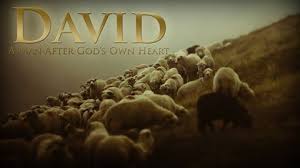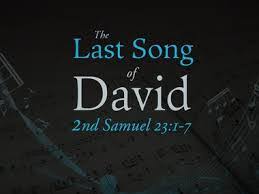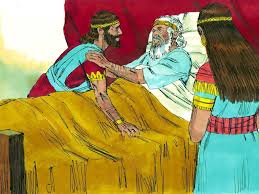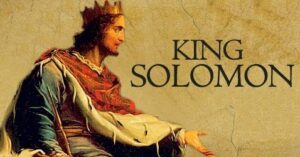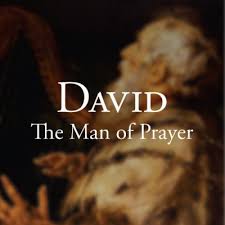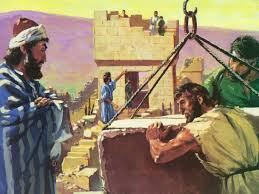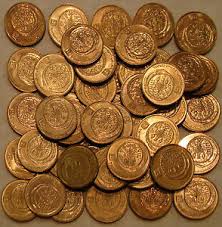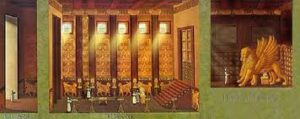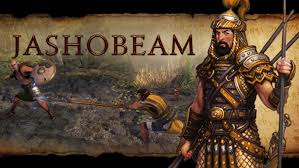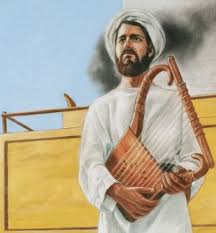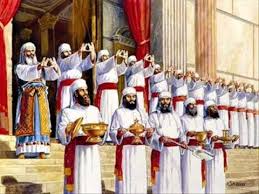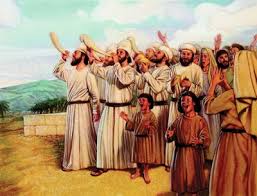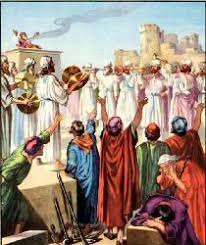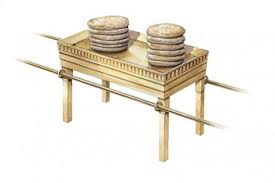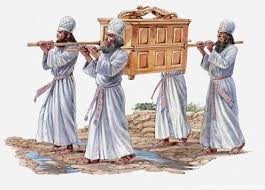Fk – End Notes
End Notes

The Life of David from a Jewish Perspective
1. The Bible Knowledge Commentary, by John Walvoord and Roy Zuck, Victor Books, Wheaton, Illinois, 1985, page 447.
2. The Jewish New Testament Commentary, by David Stern, Jewish New Testament Publications, Inc, Clarksville, Maryland, 1992, page 4.
3. 1 and 2 Samuel, Expositor’s Bible Commentary, by Ronald Youngblood, Zondervan, Grand Rapids, Michigan, 2009, page 23.
4. Ibid, pages 23-24.
5. Ibid, pages 23-24.
6. The Bible Knowledge Commentary, by John Walvoord and Roy Zuck, Victor Books, Wheaton, Illinois, 1986, page 483.
7. 1 and 2 Kings, Expositor’s Bible Commentary, by Richard Patterson and Hermann Austel, Zondervan, Grand Rapids, Michigan, 2009, page 621.
8. The Bible Knowledge Commentary, by John Walvoord and Roy Zuck, Victor Books, Wheaton, Illinois, 1986, page 484.
9. The Bible Knowledge Commentary, by John Walvoord and Roy Zuck, Victor Books, Wheaton, Illinois, 1986, page 779.
10. Psalms, The Expositor’s Bible Commentary, by Willem Vangemeren, Zondervan, Grand Rapids, Michigan, 2008, page 23.
11. The Expositor’s Bible Commentary, Volume 4, Frank Gaebelein General Editor, Zondervan, Grand Rapids, Michigan, 1988, pages 24-26.
12. Ibid, pages 305-306.
Reading Isra’el’s History Books
13. The NIV Application Commentary: 1 & 2 Samuel, by Bill Arnold, Zondervan, Grand Rapids, Michigan, 2003, pages 21-25.
14. The Big Picture, by Rosita, worldchristianfoundations.blogspot.com.
The Nature of the Psalms
15. The Bible Knowledge Commentary, by John Walvoord and Roy Zuck, Victor Books, Wheaton, Illinois, 1986, page 779-782.
16. Psalms, The Expositor’s Bible Commentary, by Willem Vangemeren, Zondervan, Grand Rapids, Michigan, 2008, page 65.
The Problem of Holy War in the TaNaKh
17. On War, by Carl von Clausewitz, Harmondsworth: Penguin Books, 1968, page 101. Initially published in 1932 under the title of Vom Kriege.
18. Ibid, page 102.
19. The Problem of War in the Old Testament, by Peter Craigie, William Eerdmans Publishing Company, Grand Rapids, Michigan, 1976, pages 46-47.
20. Christian Theology, by Millard Erickson, Baker Book House, Grand Rapids, Michigan, 1985, pages 627-630.
Young David
21. 1 and 2 Samuel, Ronald Youngblood, Zondervan, Grand Rapids, MI, 2009, page 163.
22. The Bible Knowledge Commentary, by John Walvoord and Roy Zuck, Victor Books, Wheaton, Illinois, 1986, page 447.
23. First Samuel, by Richard Phillips, P&R Publishing, Phillipsburg, NJ, 2012, page 256.
24. 1st sam 16.mp3, by Arnold Fruchtenbaum
25. The NIV Application Commentary: 1 & 2 Samuel, by Bill Arnold, Zondervan, Grand Rapids, Michigan, 2003, page 233.
26. Ibid, page 231.
27. Ibid, page 233.
28. OT Commentary on First Samuel: Be Successful, by Warren Wiersbe, David Cook Publisher, Colorado Springs, CO, 2001, page 104.
29. Grace for the Moment, Volume One, by Max Lucado, Thomas Nelson, Nashville, TN, 2000, page 253.
30. First Samuel, by Richard Phillips, P&R Publishing, Phillipsburg, NJ, 2012, page 271.
31. First and Second Samuel, by Walter Brueggemann, John Knox Press, Louisville, KY, 1990, pages 125-126.
32. 1 and 2 Samuel, Expositor’s Bible Commentary, by Ronald Youngblood, Zondervan, Grand Rapids, Michigan, 2009, page 174.
33. First Samuel, by Richard Phillips, P&R Publishing, Phillipsburg, NJ, 2012, pgs 278-279.
34. David and Goliath, by Malcolm Gladwell, Little, Brown and Company, NT, 3013, pgs 3-4.
35. Ibid, page 14.
36. First Samuel, by Richard Phillips, P&R Publishing, Phillipsburg, NJ, 2012, page 291.
37. Ibid, page 285.
38. First and Second Samuel, by Walter Brueggemann, John Knox Press, Louisville, Kentucky, 1990, page 130.
39. First Samuel, by Richard Phillips, P&R Publishing, Phillipsburg, NJ, 2012, page 283.
40. OT Commentary on First Samuel: Be Successful, by Warren Wiersbe, David Cook Publisher, Colorado Springs, CO, 2001, page 111.
41. David and Goliath, by Malcolm Gladwell, Little, Brown and Company, NY, 3013, page 9.
42. First and Second Samuel, by J. Carl Laney, Everyman’s Bible Commentary, Moody Bible Institute, Chicago, Illinois, 1982, page 73.
43. Manners and Customs of the Bible, by James Freeman, Logos International, Plainfield, New Jersey, 1972, page 136.
44. David and Goliath, by Malcolm Gladwell, Little, Brown and Company, NY, 3013, page 11.
45. OT Commentary on First Samuel: Be Successful, by Warren Wiersbe, David Cook Publisher, Colorado Springs, CO, 2001, page 112.
46. 1 and 2 Samuel, by Joyce Baldwin, TOTC, Inter-Varsity Press, Downers Grove, IL, 1988, pages 129-130.
47. First and Second Samuel, by J. Carl Laney, Everyman’s Bible Commentary, Moody Bible Institute, Chicago, Illinois, 1982, page 60.
48. 1 and 2 Samuel, Expositor’s Bible Commentary, by Ronald Youngblood, Zondervan, Grand Rapids, Michigan, 2009, page 191.
49. Twelve Unlikely Heroes, by John MacArthur, Thomas Nelson, Nashville, Tennessee, 2012, pages 101-102.
50. 1 and 2 Samuel, Expositor’s Bible Commentary, by Ronald Youngblood, Zondervan, Grand Rapids, Michigan, 2009, page 191.
51. First and Second Samuel, by Walter Brueggemann, John Knox Press, Louisville, Kentucky, 1990, page 136.
52. Ibid, page 137.
53. First Samuel, by Richard Phillips, P&R Publishing, Phillipsburg, NJ, 2012, page 327.
54. OT Commentary on First Samuel: Be Successful, by Warren Wiersbe, David Cook Publisher, Colorado Springs, CO, 2001, page 117-118.
55. Ibid, pages 115-116.
56. Ibid, page 118.
57. 1st sam18.mp3, by Arnold Fruchtenbaum
58. First and Second Samuel, by Walter Brueggemann, John Knox Press, Louisville, KY, 1990, pages 139-140.
59. Twelve Unlikely Heroes, by John MacArthur, Thomas Nelson, Nashville, Tennessee, 2012, page 102.
60. OT Commentary on First Samuel: Be Successful, by Warren Wiersbe, David Cook Publisher, Colorado Springs, Colorado, 2001, page 121.
61. First and Second Samuel, by Walter Brueggemann, John Knox Press, Louisville, KY, 1990, page 143.
62. Ibid, page 144.
63. OT Commentary on First Samuel: Be Successful, by Warren Wiersbe, David Cook Publisher, Colorado Springs, Colorado, 2001, page 124.
64. First and Second Samuel, by Walter Brueggemann, John Knox Press, Louisville, Kentucky, 1990, page 146.
65. OT Commentary on First Samuel: Be Successful, by Warren Wiersbe, David Cook Publisher, Colorado Springs, CO, 2001, pages 123-124.
66. The Making of a Man of God, by Alan Redpath, Fleming H. Revell, A Division of Baker Book House, Grand Rapids, MI, 1990, pages 60-63.
67. The Preacher’s Commentary Psalms 1-72, by Donald Williams, Thomas Nelson Publishers, Nashville, Tennessee, 1986, page 437.
68. The Preacher’s Commentary Psalms 1-72, by Donald Williams, Thomas Nelson Publishers, Nashville, Tennessee, 1986, pages 438-439.
69. First Samuel, by Richard Phillips, P&R Publishing, Phillipsburg, NJ, 2012, pgs 349-350.
70. 1 and 2 Samuel, by Joyce Baldwin, TOTC, Inter-Varsity Press, Downers Grove, Illinois, 1988, page 134.
71. First and Second Samuel, by Walter Brueggemann, John Knox Press, Louisville, Kentucky, 1990, pages 146-147.
72. 1 and 2 Samuel, by Joyce Baldwin, TOTC, Inter-Varsity Press, Downers Grove, Illinois, 1988, page 135.
73. First and Second Samuel, by Walter Brueggemann, John Knox Press, Louisville, Kentucky, 1990, page 150.
74. First Samuel, by Richard Phillips, P&R Publishing, Phillipsburg, NJ, 2012, page 354.
75. OT Commentary on First Samuel: Be Successful, by Warren Wiersbe, David Cook Publisher, Colorado Springs, Colorado, 2001, page 132.
76. First Samuel, by Richard Phillips, P&R Publishing, Phillipsburg, NJ, 2012, pgs 359-360.
David on the Run
77. Twelve Unlikely Heroes, by John MacArthur, Thomas Nelson, Nashville, Tennessee, 2012, pages 103-104.
78. 1st sam21.mp3, by Arnold Fruchtenbaum
79. 1 and 2 Samuel, Expositor’s Bible Commentary, by Ronald Youngblood, Zondervan, Grand Rapids, Michigan, 2009, page 214.
80. First and Second Samuel, by Walter Brueggemann, John Knox Press, Louisville, Kentucky, 1990, page 155.
81. First and Second Samuel, by J. Carl Laney, Everyman’s Bible Commentary, Moody Bible Institute, Chicago, Illinois, 1982, page 66.
82. OT Commentary on First Samuel: Be Successful, by Warren Wiersbe, David Cook Publisher, Colorado Springs, Colorado, 2001, page 135.
83. The Preacher’s Commentary Psalms 1-72, by Donald Williams, Thomas Nelson Publishers, Nashville, Tennessee, 1986, page 414.
84. Grace for the Moment, Volume Two, by Max Lucado, Thomas Nelson, Nashville, Tennessee, 2006, page 70.
85. Psalms, The Expositor’s Bible Commentary, by Willem Vangemeren, Zondervan, Grand Rapids, Michigan, 2008, pages 457-461.
86. The Preacher’s Commentary Psalms 1-72, by Donald Williams, Thomas Nelson Publishers, Nashville, Tennessee, 1986, page 418.
87. Psalms 1-72, by Derek Kidner, Inter-Varsity Press, Downers Grove, Illinois, 1973, pages 157-158.
88. Ibid page 158.
89. Our Daily Bread, by Tim Gustafson, RBC Ministries, Grand Rapids, MI, N-O-D, 2010.
90. Psalms, The Expositor’s Bible Commentary, by Willem Vangemeren, Zondervan, Grand Rapids, Michigan, 2008, page 328.
91. The Making of a Man of God, by Alan Redpath, Baker Book House, Grand Rapids, Michigan, 1962, page 94.
92. OT Commentary on First Samuel: Be Successful, by Warren Wiersbe, David Cook Publisher, Colorado Springs, Colorado, 2001, page 136.
93. Psalms 73-150, by Derek Kidner, Inter-Varsity Press, Downers Grove, IL, 1975, p 509.
94. Ibid, page 511.
95. 1st sam22.mp3, by Arnold Fruchtenbaum.
96. First Samuel, by Richard Phillips, P & R Pub, Phillipsburg, New Jersey, 2012, page 377.
97. 1st Sam22.mp3, by Arnold Fruchtenbaum.
98. First and Second Samuel, by Walter Brueggemann, John Knox Press, Louisville, Kentucky, 1990, page 158.
99. 1st sam22.mp3, by Arnold Fruchtenbaum.
100. OT Commentary on First Samuel: Be Successful, by Warren Wiersbe, David Cook Publisher, Colorado Springs, Colorado, 2001, pages 137-138.
101. Ibid, page 140.
102. First and Second Samuel, by Walter Brueggemann, John Knox Press, Louisville, Kentucky, 1990, pages 160-162.
103. Psalms 1-72, by Derek Kidner, Inter-Varsity Press, Downers Grove, IL, 1973, page 212.
104. Psalms, The Expositor’s Bible Commentary, by Willem Vangemeren, Zondervan, Grand Rapids, Michigan, 2008, page 440.
105. Ibid, page 443.
106. 1st Sam23.mp3, by Arnold Fruchtenbaum.
107. OT Commentary on First Samuel: Be Successful, by Warren Wiersbe, David Cook Publisher, Colorado Springs, Colorado, 2001, pages 145-146.
108. 1 and 2 Samuel, Expositor’s Bible Commentary, by Ronald Youngblood, Zondervan, Grand Rapids, Michigan, 2009, page 225.
109. First Samuel, by Richard Phillips, P & R Pub, Phillipsburg, New Jersey, 2012, page 388.
110. First and Second Samuel, by Walter Brueggemann, John Knox Press, Louisville, Kentucky, 1990, page 162.
111. 1st Sam23.mp3, by Arnold Fruchtenbaum.
112. First Samuel, by Richard Phillips, P & R Pub, Phillipsburg, New Jersey, 2012, page 391.
113. Second Samuel, by Walter Brueggemann, John Knox Press, Louisville, KY, 1990, p 163.
114. Ibid, page 164.
115. 1st Sam23.mp3, by Arnold Fruchtenbaum.
116. 1 and 2 Samuel, by Joyce Baldwin, TOTC, Inter-Varsity Press, Downers Grove, Illinois, 1988, page 144.
117. Second Samuel, by Walter Brueggemann, John Knox Press, Louisville, KY, 1990, pg 165.
118. OT Commentary on First Samuel: Be Successful, by Warren Wiersbe, David Cook Publisher, Colorado Springs, Colorado, 2001, page 149.
119. First Samuel, by Richard Phillips, P & R Pub, Phillipsburg, NJ, 2012, pages 407-408.
120. Psalms 1-72, by Derek Kidner, Inter-Varsity Press, Downers Grove, IL, 1973, pg 242.
121. Psalms, The Expositor’s Bible Commentary, by Willem Vangemeren, Zondervan, Grand Rapids, Michigan, 2008, page 489.
122. Psalms 1-72, by Derek Kidner, Inter-Varsity Press, Downers Grove, IL, 1973, pg 242.
123. Psalms, The Expositor’s Bible Commentary, by Willem Vangemeren, Zondervan, Grand Rapids, Michigan, 2008, page 489.
124. The Preacher’s Commentary Psalms 1-72, by Donald Williams, Thomas Nelson Publishers, Nashville, Tennessee, 1986, pages 459-460.
125. Ibid, pages 461-462.
126. Ibid, page 402.
127. Ibid, page 403.
128. Psalms, Expositor’s Bible Commentary, by Willem VanGemeren, Zondervan, Grand Rapids, Michigan, 2008, page 449.
129. The Bible Knowledge Commentary, by John Walvoord and Roy Zuck, Victor Books, Wheaton, Illinois, 1986, page 834.
130. The Preacher’s Commentary Psalms 1-72, by Donald Williams, Thomas Nelson Publishers, Nashville, Tennessee, 1986, page 404.
131. 1 and 2 Samuel, Expositor’s Bible Commentary, by Ronald Youngblood, Zondervan, Grand Rapids, Michigan, 2009, page 231.
132. OT Commentary on First Samuel: Be Successful, by Warren Wiersbe, David Cook Publisher, Colorado Springs, CO, 2001, page 150.
133. Ibid, page 150.
134. 1st sam24.mp3, by Arnold Fruchtenbaum.
135. First and Second Samuel, by Walter Brueggemann, John Knox Press, Louisville, Kentucky, 1990, pages 171-173.
136. The Making of a Man of God, by Alan Redpath, Baker Book House, Grand Rapids, Michigan, 1962, page 117.
137. The Preacher’s Commentary Psalms 1-72, by Donald Williams, Thomas Nelson Publishers, Nashville, Tennessee, 1986, page pages 419-420.
138. Psalms 1-72, by Derek Kidner, Inter-Varsity Press, Downers Grove, IL, 1973, pg 224.
139. Psalms, The Expositor’s Bible Commentary, by Willem Vangemeren, Zondervan, Grand Rapids, Michigan, 2008, page 464.
140. The Preacher’s Commentary Psalms 1-72, by Donald Williams, Thomas Nelson Publishers, Nashville, Tennessee, 1986, pages 423-424.
141. 1 and 2 Samuel, Ronald Youngblood, Zondervan, Grand Rapids, MI, 2009, page 237.
142. 1 and 2 Samuel, by Joyce Baldwin, TOTC, InterVarsity Press, Downers Grove, Illinois, 1988, page 147.
143. First Samuel, by Richard Phillips, P & R Pub, Phillipsburg, NJ, 2012, pages 424-425.
144. 1 and 2 Samuel, by Joyce Baldwin, TOTC, InterVarsity Press, Downers Grove, Illinois, 1988, pages 148-149.
145. The Making of a Man of God, by Alan Redpath, Baker Book House, Grand Rapids, Michigan, 1962, pages 127-129.
146. 1 and 2 Samuel, by Joyce Baldwin, TOTC, InterVarsity Press, Downers Grove, Illinois, 1988, page 149.
147. 1st sam25.mp3, by Arnold Fruchtenbaum.
148. First Samuel, by Richard Phillips, P&R Publishing, Phillipsburg, NJ, 2012, pgs 430-432.
149. 1 and 2 Samuel, Expositor’s Bible Commentary, by Ronald Youngblood, Zondervan, Grand Rapids, Michigan, 2009, page 249.
150. 1 and 2 Samuel, by Joyce Baldwin, TOTC, Inter-Varsity Press, Downers Grove, Illinois, 1988, page 151.
151. First Samuel, by Richard Phillips, P&R Publishing, Phillipsburg, NJ, 2012, page 433.
152. 1 and 2 Samuel, Expositor’s Bible Commentary, by Ronald Youngblood, Zondervan, Grand Rapids, Michigan, 2009, page 252.
153. 1 and 2 Samuel, by Joyce Baldwin, TOTC, Inter-Varsity Press, Downers Grove, Illinois, 1988, page 153.
154. First Samuel, by Richard Phillips, P&R Publishing, Phillipsburg, NJ, 2012, pgs 444-445.
155. 1 and 2 Samuel, Ronald Youngblood, Zondervan, Grand Rapids, MI, 2009, page 253.
156. OT Commentary on First Samuel: Be Successful, by Warren Wiersbe, David Cook Publisher, Colorado Springs, CO, 2001, page 165.
157. First and Second Samuel, by Walter Brueggemann, John Knox Press, Louisville, Kentucky, 1990, page 183.
158. 1st sam26.mp3, by Arnold Fruchtenbaum.
159. First and Second Samuel, by Walter Brueggemann, John Knox Press, Louisville, Kentucky, 1990, page 184.
160. First Samuel, by Richard Phillips, P&R Publishing, Phillipsburg, NJ, 2012, page 453.
161. First and Second Samuel, by Walter Brueggemann, John Knox Press, Louisville, Kentucky, 1990, pages 186-187.
162. OT Commentary on First Samuel: Be Successful, by Warren Wiersbe, David Cook Publisher, Colorado Springs, Colorado, 2001, page 167.
163. 1 and 2 Samuel, Expositor’s Bible Commentary, by Ronald Youngblood, Zondervan, Grand Rapids, Michigan, 2009, page 259.
164. First and Second Samuel, by Walter Brueggemann, John Knox Press, Louisville, Kentucky, 1990, page 187.
165. 1 and 2 Samuel, Ronald Youngblood, Zondervan, Grand Rapids, MI, 2009, pgs 260-261.
166. 1 and 2 Samuel, by Joyce Baldwin, TOTC, Inter-Varsity Press, Downers Grove, Illinois, 1988, page 156.
167. 1 and 2 Samuel, Ronald Youngblood, Zondervan, Grand Rapids, MI, 2009, page 261.
168. 1st sam27.mp3, by Arnold Fruchtenbaum.
169. 1 and 2 Samuel, Expositor’s Bible Commentary, by Ronald Youngblood, Zondervan, Grand Rapids, Michigan, 2009, page 276.
170. 1 and 2 Samuel, by Joyce Baldwin, TOTC, Intervarsity Press, Downers Grove, Illinois, 1988, page 165.
171. 1st sam29.mp3, by Arnold Fruchtenbaum
172. 1 and 2 Samuel, Expositor’s Bible Commentary, by Ronald Youngblood, Zondervan, Grand Rapids, Michigan, 2009, page 276.
173. OT Commentary on First Samuel: Be Successful, by Warren Wiersbe, David Cook Publisher, Colorado Springs, Colorado, 2001, page 183.
174. 1 and 2 Samuel, by Joyce Baldwin, TOTC, InterVarsity Press, Downers Grove, Illinois, 1988, page 159.
175. First and Second Samuel, by Walter Brueggemann, John Knox Press, Louisville, Kentucky, 1990, pages 194-195.
176. First Samuel, by Richard Phillips, P&R Publishing, Phillipsburg, NJ, 2012, pgs 479-480.
177. 1 and 2 Samuel, by Joyce Baldwin, TOTC, Inter-Varsity Press, Downers Grove, Illinois, 1988, pages 160-161.
178. First Samuel, by Richard Phillips, P&R Publishing, Phillipsburg, NJ, 2012, pgs 482-483.
179. OT Commentary on First Samuel: Be Successful, by Warren Wiersbe, David Cook Publisher, Colorado Springs, Colorado, 2001, pages 187-188.
180. First and Second Chronicles, by J. G. McConville, The Westminster Press, Philadelphia, Pennsylvania, 1984, page 17.
181. 1st sam31.mp3, by Arnold Fruchtenbaum.
182. Twelve Unlikely Heroes, by John MacArthur, Thomas Nelson, Nashville, Tennessee, 2012, pages 107-108.
183. 1 and 2 Samuel, Ronald Youngblood, Zondervan, Grand Rapids, MI, 2009, page 293.
184. Ibid, page 293.
185. Second Samuel by Dale Ralph Davis, Christian Focus Publications, Ross-shire, Scotland, 2002, pages 14-15.
186. 2nd sam1.mp3, by Arnold Fruchtenbaum.
187. 1 and 2 Samuel, Ronald Youngblood, Zondervan, Grand Rapids, MI, 2009, page 298.
188. OT Commentary on Second Samuel and First Chronicles: Be Restored, by Warren Wiersbe, David Cook Publisher, Colorado Springs, Colorado, 2002, pages 19-20.
189. Second Samuel by Dale Ralph Davis, Christian Focus Publications, Ross-shire, Scotland, 2002, page 15-16.
190. The NIV Application Commentary: 1 & 2 Samuel, by Bill Arnold, Zondervan, Grand Rapids, Michigan, 2003, page 414.
191. Second Samuel by Dale Ralph Davis, Christian Focus Publications, Ross-shire, Scotland, 2002, page 24.
192. Ibid, pages 25-26.
193. First and Second Samuel, by Walter Brueggemann, John Knox Press, Louisville, Kentucky, 1990, pages 214-215.
194. OT Commentary on Second Samuel and First Chronicles: Be Restored, by Warren Wiersbe, David Cook Publisher, Colorado Springs, Colorado, 2002, page 21.
195. 1 and 2 Samuel, by Joyce Baldwin, TOTC, Inter-Varsity Press, Downers Grove, Illinois, 1988, page 179.
196. OT Commentary on Second Samuel and First Chronicles: Be Restored, by Warren Wiersbe, David Cook Publisher, Colorado Springs, Colorado, 2002, page 22.
197. First and Second Samuel, by Walter Brueggemann, John Knox Press, Louisville, Kentucky, 1990, pages 215-216.
198. 1 and 2 Samuel, by Joyce Baldwin, TOTC, Inter-Varsity Press, Downers Grove, Illinois, 1988, page 181.
199. 1 and 2 Samuel, Expositor’s Bible Commentary, by Ronald Youngblood, Zondervan, Grand Rapids, Michigan, 2009, page 307.
200. Ibid, page 279.
201. First Samuel, by Richard Phillips, P&R Publishing, Phillipsburg, New Jersey, 2012, pages 497-498.
202. 1 and 2 Samuel, by Joyce Baldwin, TOTC, Inter-Varsity Press, Downers Grove, Illinois, 1988, page 166.
203. First Samuel, by Richard Phillips, P&R Publishing, Phillipsburg, NJ, 2012, page 498.
204. 1 and 2 Samuel, Expositor’s Bible Commentary, by Ronald Youngblood, Zondervan, Grand Rapids, Michigan, 2009, page 282.
205. First Samuel, by Richard Phillips, P&R Publishing, Phillipsburg, NJ, 2012, page 501.
206. Ibid, page 501.
207. First and Second Samuel, by Walter Brueggemann, John Knox Press, Louisville, Kentucky, 1990, page 202.
208. 1 and 2 Samuel, by Joyce Baldwin, TOTC, Inter-Varsity Press, Downers Grove, Illinois, 1988, pages 168-169.
209. Ibid, page 170.
210. First Samuel, by Richard Phillips, P&R Publishing, Phillipsburg, NJ, 2012, page 508.
King David
211. 1 and 2 Samuel, by Joyce Baldwin, Inter-Varsity Press, Downers Grove, Illinois, 1988, page 183.
212. Second Samuel by Dale Ralph Davis, Christian Focus Publications, Ross-shire, Scotland, 2002, pages 32-33.
213. 2ndsam2.mp3, by Arnold Fruchtenbaum.
214. First and Second Samuel, by Walter Brueggemann, John Knox Press, Louisville, Kentucky, 1990, page 220.
215. Second Samuel by Dale Ralph Davis, Christian Focus Publications, Ross-shire, Scotland, 2002, pages 35-36.
216. First and Second Chronicles, by J. G. McConville, The Westminster Press, Philadelphia, Pennsylvania, 1984, page 32.
217. Japhet, Sara. First and Second Chronicles, by Sara Japhet, Westminster John Knox, Louisville, Kentucky, 1993, pages 269-270.
218. First and Second Chronicles, by J. G. McConville, The Westminster Press, Philadelphia, Pennsylvania, 1984, pages 34-35.
219. 2ndsam3.mp3, by Arnold Fruchtenbaum.
220. OT Commentary on Second Samuel and First Chronicles: Be Restored, by Warren Wiersbe, David Cook Publisher, Colorado Springs, CO, 2002, page 30-31.
221. 1 and 2 Samuel, by Joyce Baldwin, TOTC, Inter-Varsity Press, Downers Grove, Illinois, 1988, page 185.
222. First and Second Samuel, by Walter Brueggemann, John Knox Press, Louisville, Kentucky, 1990, pages 222-223.
223. Ibid, page 224.
224. 1 and 2 Samuel, by Joyce Baldwin, TOTC, Inter-Varsity Press, Downers Grove, Illinois, 1988, page 187.
225. First and Second Samuel, by Walter Brueggemann, John Knox Press, Louisville, Kentucky, 1990, page 225.
226. 1 and 2 Samuel, Ronald Youngblood, Zondervan, Grand Rapids, MI, 2009, page 324.
227. First and Second Samuel, by Walter Brueggemann, John Knox Press, Louisville, Kentucky, 1990, page 225.
228. Ibid, page 226.
229. 1 and 2 Samuel, by Joyce Baldwin, TOTC, Inter-Varsity Press, Downers Grove, Illinois, 1988, page 188.
230. 2ndsam3.mp3, by Arnold Fruchtenbaum.
231. First and Second Samuel, by Walter Brueggemann, John Knox Press, Louisville, Kentucky, 1990, page 288.
232. OT Commentary on Second Samuel and First Chronicles: Be Restored, by Warren Wiersbe, David Cook Publisher, Colorado Springs, CO, 2002, page 37.
233. Second Samuel by Dale Ralph Davis, Christian Focus Publications, Ross-shire, Scotland, 2002, page 45.
234. OT Commentary on Second Samuel and First Chronicles: Be Restored, by Warren Wiersbe, David Cook Publisher, Colorado Springs, CO, 2002, pages 37-38.
235. 1 and 2 Samuel, Ronald Youngblood, Zondervan, Grand Rapids, MI, 2009, page 331.
236. First and Second Samuel, by Walter Brueggemann, John Knox Press, Louisville, Kentucky, 1990, page 229.
237. 1 and 2 Samuel, Ronald Youngblood, Zondervan, Grand Rapids, MI, 2009, page 333.
238. 1 and 2 Samuel, by Joyce Baldwin, TOTC, Inter-Varsity Press, Downers Grove, Illinois, 1988, pages 190-191.
239. OT Commentary on Second Samuel and First Chronicles: Be Restored, by Warren Wiersbe, David Cook Publisher, Colorado Springs, CO, 2002, page 38.
240. 1 and 2 Samuel, by Joyce Baldwin, TOTC, Inter-Varsity Press, Downers Grove, Illinois, 1988, page 191.
241. Ibid, page 192.
242. OT Commentary on Second Samuel and First Chronicles: Be Restored, by Warren Wiersbe, David Cook Publisher, Colorado Springs, CO, 2002, page 39.
243. 2nd Sam3.mp3, by Arnold Fruchtenbaum.
244. 1 and 2 Samuel, by Joyce Baldwin, TOTC, Inter-Varsity Press, Downers Grove, Illinois, 1988, page 193-194.
245. 1 and 2 Samuel, by Joyce Baldwin, TOTC, Inter-Varsity Press, Downers Grove, Illinois, 1988, page 194.
246. 1 and 2 Samuel, Expositor’s Bible Commentary, by Ronald Youngblood, Zondervan, Grand Rapids, Michigan, 2009, page 343.
247. Second Samuel by Dale Ralph Davis, Christian Focus Publications, Ross-shire, Scotland, 2002, page 65.
248. 1 and 2 Samuel, Expositor’s Bible Commentary, by Ronald Youngblood, Zondervan, Grand Rapids, Michigan, 2009, page 344.
249. 1 and 2 Samuel, by Joyce Baldwin, TOTC, Inter-Varsity Press, Downers Grove, Illinois, 1988, page 195.
250. First and Second Samuel, by Walter Brueggemann, John Knox Press, Louisville, Kentucky, 1990, page 239.
251. 1 and 2 Samuel, by Joyce Baldwin, TOTC, Inter-Varsity Press, Downers Grove, Illinois, 1988, pages 202-203.
252. Ibid, pages 204-205.
253. 1 and 2 Samuel, Expositor’s Bible Commentary, by Ronald Youngblood, Zondervan, Grand Rapids, Michigan, 2009, page 347.
254. Subterranean Waterworks of Biblical Jerusalem: Adaptation of a Karst System, by Dan Gill, Science 254 [December 1991], pages 1467-1470.
255. 1 and 2 Samuel, Expositor’s Bible Commentary, by Ronald Youngblood, Zondervan, Grand Rapids, Michigan, 2009, page 349.
256. Ibid, page 352.
257. First and Second Samuel, by Walter Brueggemann, John Knox Press, Louisville, Kentucky, 1990, page 241.
258. OT Commentary on Second Samuel and First Chronicles: Be Restored, by Warren Wiersbe, David Cook Publisher, Colorado Springs, Colorado, 2002, page 52.
259. 1 and 2 Samuel, by Joyce Baldwin, TOTC, Inter-Varsity Press, Downers Grove, Illinois, 1988, pages 205-206.
260. OT Commentary on Second Samuel and First Chronicles: Be Restored, by Warren Wiersbe, David Cook Publisher, Colorado Springs, Colorado, 2002, page 53.
261. First and Second Chronicles, by Sara Japhet, Westminster John Knox, Louisville, Kentucky, 1993, page 277.
262. 1 and 2 Samuel, by Joyce Baldwin, TOTC, Inter-Varsity Press, Downers Grove, Illinois, 1988, page 206.
263. OT Commentary on Second Samuel and First Chronicles: Be Restored, by Warren Wiersbe, David Cook Publisher, Colorado Springs, Colorado, 2002, pages 54-55.
264. The Expositor’s Bible Commentary, Volume 4, Frank Gaebelein General Editor, Zondervan, Grand Rapids, Michigan, 1988, page 387).
265. 1 and 2 Samuel, by Joyce Baldwin, TOTC, Inter-Varsity Press, Downers Grove, IL, 1988, pages 209-210.
266. Ibid, page 211.
267. 2ndsam6.mp3, by Arnold Fruchtenbaum.
268. The Making of a Man of God, by Alan Redpath, Baker Book House, Grand Rapids, Michigan, 1962, page 191.
269. The Message of Chronicles, Alec Motyer Series Editor, Intervarsity Press, Nottingham, England, 1987, page 71.
270. The Expositor’s Bible Commentary, Volume 4, Frank Gaebelein General Editor, Zondervan, Grand Rapids, Michigan, 1988, page 388.
271. The Expositor’s Bible Commentary, Volume 4, Frank Gaebelein General Editor, Zondervan, Grand Rapids, Michigan, 1988, page 391.
272. First and Second Chronicles, by Sara Japhet, Westminster John Knox, Louisville, Kentucky, 1993, page 318.
273. Psalms, The Expositor’s Bible Commentary, by Willem Vangemeren, Zondervan, Grand Rapids, Michigan, 2008, page 723.
274. Psalms, The Expositor’s Bible Commentary, by Willem Vangemeren, Zondervan, Grand Rapids, Michigan, 2008, page 723.
275. The Message of Chronicles, Alec Motyer Series Editor, Intervarsity Press, Nottingham, England, 1987, page 72.
276. The Expositor’s Bible Commentary, Volume 4, Frank Gaebelein General Editor, Zondervan, Grand Rapids, Michigan, 1988, page 393.
277. The Bible Knowledge Commentary, by John Walvoord and Roy Zuck, Victor Books, Wheaton, Illinois, 1986, page 607.
278. First and Second Chronicles, by Sara Japhet, Westminster John Knox, Louisville, Kentucky, 1993, page 324.
279. 1 and 2 Samuel, by Joyce Baldwin, TOTC, Inter-Varsity Press, Downers Grove, Illinois, 1988, page 213.
280. Second Samuel by Dale Ralph Davis, Christian Focus Publications, Ross-shire, Scotland, 2002, page 85.
281. The Making of a Man of God, by Alan Redpath, Fleming H. Revell, A Division of Baker Book House, Grand Rapids, Michigan, 1990, page 202.
282. 1 and 2 Samuel, by Joyce Baldwin, TOTC, Inter-Varsity Press, Downers Grove, Illinois, 1988, page 214.
283. OT Commentary on Second Samuel and First Chronicles: Be Restored, by Warren Wiersbe, David Cook Publisher, Colorado Springs, Colorado, 2002, page 65.
284. 2ndsam7.mp3, by Arnold Fruchtenbaum.
285. 2ndsam7.mp3, by Arnold Fruchtenbaum.
286. The Making of a Man of God, by Alan Redpath, Fleming H. Revell, A Division of Baker Book House, Grand Rapids, MI, 1990, page 204.
287. The Making of a Man of God, by Alan Redpath, Fleming H. Revell, A Division of Baker Book House, Grand Rapids, Michigan, 1990, page 205.
288. The Preacher’s Commentary Psalms 73-150, by Donald Williams, Thomas Nelson Publishers, Nashville, Tennessee, 1989, page 433.
289. Psalms, The Expositor’s Bible Commentary, by Willem Vangemeren, Zondervan, Grand Rapids, Michigan, 2008, page 926.
290. Ibid, page 927.
291. The Preacher’s Commentary Psalms 73-150, by Donald Williams, Thomas Nelson Publishers, Nashville, Tennessee, 1989, page 435.
292. Ibid, pages 436-437.
293. OT Commentary on Second Samuel and First Chronicles: Be Restored, by Warren Wiersbe, David Cook Publisher, Colorado Springs, Colorado, 2002, pages 66-67.
294. Ibid, page 67.
295. Ibid, page 67.
296. 1 and 2 Samuel, by Joyce Baldwin, TOTC, Inter-Varsity Press, Downers Grove, Illinois, 1988, page 218.
297. Ibid, page 219.
298. First and Second Samuel, by Walter Brueggemann, John Knox Press, Louisville, Kentucky, 1990, pages 260-261.
299. The Preacher’s Commentary Psalms 1-72, by Donald Williams, Thomas Nelson Publishers, Nashville, Tennessee, 1986, pages 440-441.
300. Psalms, The Expositor’s Bible Commentary, by Willem Vangemeren, Zondervan, Grand Rapids, Michigan, 2008, page 477.
301. Psalms 1-72, by Derek Kidner, Inter-Varsity Press, Downers Grove, IL, 1973, pg 234.
302. Psalms, The Expositor’s Bible Commentary, by Willem Vangemeren, Zondervan, Grand Rapids, Michigan, 2008, page 478.
303. Ibid, page 479.
304. The Preacher’s Commentary Psalms 1-72, by Donald Williams, Thomas Nelson Publishers, Nashville, Tennessee, 1986, pages 444-445.
305. 1 and 2 Samuel, Expositor’s Bible Commentary, by Ronald Youngblood, Zondervan, Grand Rapids, Michigan, 2009, page 399.
306. The Making of a Man of God, by Alan Redpath, Fleming H. Revell, A Division of Baker Book House, Grand Rapids, Michigan, 1990, page 213.
307. 1 and 2 Samuel, by Joyce Baldwin, TOTC, Inter-Varsity Press, Downers Grove, Illinois, 1988, pages 220-221.
308. 2nd sam8.mp3, by Arnold Fruchtenbaum.
309. The Making of a Man of God, by Alan Redpath, Fleming H. Revell, A Division of Baker Book House, Grand Rapids, Michigan, 1990, pages 216-217.
310. Second Samuel by Dale Ralph Davis, Christian Focus Publications, Ross-shire, Scotland, 2002, pages 114-115.
311. 1 and 2 Samuel, by Joyce Baldwin, TOTC, Intervarsity Press, Downers Grove, Illinois, 1988, page 224.
312. 1 and 2 Samuel, Expositor’s Bible Commentary, by Ronald Youngblood, Zondervan, Grand Rapids, Michigan, 2009, page 411.
313. 1 and 2 Samuel, by Joyce Baldwin, TOTC, Inter-Varsity Press, Downers Grove, Illinois, 1988, page 225-226.
314. First and Second Samuel, by J. Carl Laney, Everyman’s Bible Commentary, Moody Bible Institute, Chicago, Illinois, 1982, page, 106.
315. 1 and 2 Samuel, by Joyce Baldwin, TOTC, Inter-Varsity Press, Downers Grove, Illinois, 1988, page 226.
316. 2ndsam3.mp3, by Arnold Fruchtenbaum.
317. 1 and 2 Samuel, by Joyce Baldwin, TOTC, Inter-Varsity Press, Downers Grove, Illinois, 1988, page 227.
318. Twelve Unlikely Heroes, by John MacArthur, Nelson, Nashville, TN, 2012, page 234.
319. 1 and 2 Samuel, by Joyce Baldwin, TOTC, Inter-Varsity Press, Downers Grove, Illinois, 1988, page 229.
320. 1 and 2 Samuel, Expositor’s Bible Commentary, by Ronald Youngblood, Zondervan, Grand Rapids, Michigan, 2009, page 426.
321. First and Second Samuel, by Walter Brueggemann, John Knox Press, Louisville, Kentucky, 1990, page 271.
322. Ibid, pages 271-272.
323. 1 and 2 Samuel, Expositor’s Bible Commentary, by Ronald Youngblood, Zondervan, Grand Rapids, Michigan, 2009, page 428.
324. The Making of a Man of God, by Alan Redpath, Fleming H. Revell, A Division of Baker Book House, Grand Rapids, Michigan, 1990, page 235.
325. Answers to Tough Questions From Every Book in the Bible, by J. Carl Laney, Wipf & Stock, Eugene, Oregon, 1997, page 76.
326. The Making of a Man of God, by Alan Redpath, Fleming H. Revell, A Division of Baker Book House, Grand Rapids, Michigan, 1990, pages 237-238.
327. First and Second Samuel, by Walter Brueggemann, John Knox Press, Louisville, Kentucky, 1990, pages 273-274.
328. The Making of a Man of God, by Alan Redpath, Fleming H. Revell, A Division of Baker Book House, Grand Rapids, Michigan, 1990, pages 238-240.
329. 2ndsam11.mp3, by Arnold Fruchtenbaum.
330. 1 and 2 Samuel, by Joyce Baldwin, TOTC, Inter-Varsity Press, Downers Grove, Illinois, 1988, page 233.
331. 2ndsam11.mp3, by Arnold Fruchtenbaum.
332. First and Second Samuel, by Walter Brueggemann, John Knox Press, Louisville, Kentucky, 1990, page 277.
333. 1 and 2 Samuel, by Joyce Baldwin, TOTC, Inter-Varsity Press, Downers Grove, Illinois, 1988, pages 234-235.
334. OT Commentary on Second Samuel and First Chronicles: Be Restored, by Warren Wiersbe, David Cook Publisher, Colorado Springs, Colorado, 2002, pages 85-86.
335. 1 and 2 Samuel, by Joyce Baldwin, TOTC, Inter-Varsity Press, Downers Grove, Illinois, 1988, page 235.
336. The Making of a Man of God, by Alan Redpath, Fleming H. Revell, Baker Book House, Grand Rapids, Michigan, 1990, page 241.
337. OT Commentary on Second Samuel and First Chronicles: Be Restored, by Warren Wiersbe, David Cook Publisher, Colorado Springs, Colorado, 2002, pages 89-90.
338. Second Samuel by Dale Ralph Davis, Christian Focus Publications, Ross-shire, Scotland, 2002, page 155.
339. The Making of a Man of God, by Alan Redpath, Baker Book House, Grand Rapids, Michigan, 1962, page 242-243.
340. OT Commentary on Second Samuel and First Chronicles: Be Restored, by Warren Wiersbe, David Cook Publisher, Colorado Springs, Colorado, 2002, page 93.
341. 1 and 2 Samuel, Expositor’s Bible Commentary, by Ronald Youngblood, Zondervan, Grand Rapids, Michigan, 2009, page 449.
342. Answers to Tough Questions From Every Book in the Bible, by J. Carl Laney, Wipf & Stock, Eugene, Oregon, 1997, page 77.
343. OT Commentary on Second Samuel and First Chronicles: Be Restored, by Warren Wiersbe, David Cook Publisher, Colorado Springs, Colorado, 2002, page 93.
344. Ibid, page 94.
345. OT Commentary on Second Samuel and First Chronicles: Be Restored, by Warren Wiersbe, David Cook Publisher, Colorado Springs, Colorado, 2002, page 95.
346. The Preacher’s Commentary Psalms 1-72, by Donald Williams, Thomas Nelson Publishers, Nashville, Tennessee, 1986, pages 385-386.
347. gotQuestions?org
348. The Bible Knowledge Commentary, by John Walvoord and Roy Zuck, Victor Books, Wheaton, Illinois, 1986, page 832.
349. The Preacher’s Commentary Psalms 1-72, by Donald Williams, Thomas Nelson Publishers, Nashville, Tennessee, 1986, page 388.
350. Ibid, pages 389-390.
351. Ibid, page 391.
352. Ibid, page 392.
353. The Bible Knowledge Commentary, by John Walvoord and Roy Zuck, Victor Books, Wheaton, Illinois, 1986, page 833.
354. The Preacher’s Commentary Psalms 1-72, by Donald Williams, Thomas Nelson Publishers, Nashville, Tennessee, 1986, pages 394.
355. OT Commentary on Second Samuel and First Chronicles: Be Restored, by Warren Wiersbe, David Cook Publisher, Colorado Springs, Colorado, 2002, page 95.
356. 1 and 2 Samuel, by Joyce Baldwin, TOTC, Inter-Varsity Press, Downers Grove, Illinois, 1988, page 245-246.
357. Second Samuel by Dale Ralph Davis, Christian Focus Publications, Ross-shire, Scotland, 2002, page 160.
358. The Bible Knowledge Commentary, by John Walvoord and Roy Zuck, Victor Books, Wheaton, Illinois, 1986, page 469.
359. OT Commentary on First Samuel: Be Successful, by Warren Wiersbe, David Cook Publisher, Colorado Springs, Colorado, 2001, page 100.
360. Second Samuel by Dale Ralph Davis, Christian Focus Publications, Ross-shire, Scotland, 2002, page 168-169.
361. Second Samuel by Dale Ralph Davis, Christian Focus Publications, Ross-shire, Scotland, 2002, page 168.
362. OT Commentary on First Samuel: Be Successful, by Warren Wiersbe, David Cook Publisher, Colorado Springs, Colorado, 2001, pages 99-100.
363. First and Second Samuel, by Walter Brueggemann, John Knox Press, Louisville, Kentucky, 1990, page 289.
364. OT Commentary on Second Samuel and First Chronicles: Be Restored, by Warren Wiersbe, David Cook Publisher, Colorado Springs, Colorado, 2002, page 106.
365. 1 and 2 Samuel, by Joyce Baldwin, TOTC, Inter-Varsity Press, Downers Grove, IL, 1988, page 252.
366. Second Samuel by Dale Ralph Davis, Christian Focus Publications, Ross-shire, Scotland, 2002, pages 173-174.
367. First and Second Samuel, by Walter Brueggemann, John Knox Press, Louisville, Kentucky, 1990, page 291.
368. 1 and 2 Samuel, Expositor’s Bible Commentary, by Ronald Youngblood, Zondervan, Grand Rapids, Michigan, 2009, page 476.
369. 1 and 2 Samuel, by Joyce Baldwin, TOTC, Inter-Varsity Press, Downers Grove, Illinois, 1988, page 253.
370. 2ndsam14.mp3, by Arnold Fruchtenbaum.
371. Second Samuel by Dale Ralph Davis, Christian Focus Publications, Ross-shire, Scotland, 2002, page 178.
372. Ibid, page 175.
373. First and Second Samuel, by Walter Brueggemann, John Knox Press, Louisville, Kentucky, 1990, pages 295-296.
374. 1 and 2 Samuel, by Joyce Baldwin, TOTC, Inter-Varsity Press, Downers Grove, Illinois, 1988, page 255.
375. First and Second Samuel, by Walter Brueggemann, John Knox Press, Louisville, Kentucky, 1990, page 297.
376. 1 and 2 Samuel, by Joyce Baldwin, TOTC, Inter-Varsity Press, Downers Grove, Illinois, 1988, page 256.
377. OT Commentary on Second Samuel and First Chronicles: Be Restored, by Warren Wiersbe, David Cook Publisher, Colorado Springs, Colorado, 2002, page 110.
378. 1 and 2 Samuel, Expositor’s Bible Commentary, by Ronald Youngblood, Zondervan, Grand Rapids, Michigan, 2009, pages 488-489.
379. OT Commentary on Second Samuel and First Chronicles: Be Restored, by Warren Wiersbe, David Cook Publisher, Colorado Springs, Colorado, 2002, page 111.
David the Ousted King
380. First and Second Samuel, by Walter Brueggemann, John Knox Press, Louisville, KY, 1990, page 300.
381. The Making of a Man of God, by Alan Redpath, Fleming H. Revell, A Division of Baker Book House, Grand Rapids, MI, 1990, page 256.
382. First and Second Samuel, by Walter Brueggemann, John Knox Press, Louisville, Kentucky, 1990, page 301.
383. 2ndsam15.mp3, by Arnold Fruchtenbaum.
384. First and Second Samuel, by Walter Brueggemann, John Knox Press, Louisville, Kentucky, 1990, page 302.
385. 2nd sam15.mp3, by Arnold Fruchtenbaum.
386. 1 and 2 Samuel, by Joyce Baldwin, TOTC, Inter-Varsity Press, Downers Grove, Illinois, 1988, page 261.
387. OT Commentary on Second Samuel and First Chronicles: Be Restored, by Warren Wiersbe, David Cook Publisher, Colorado Springs, Colorado, 2002, page 122.
388. 1 and 2 Samuel, Expositor’s Bible Commentary, by Ronald Youngblood, Zondervan, Grand Rapids, Michigan, 2009, page 500.
389. The Making of a Man of God, by Alan Redpath, Fleming H. Revell, A Division of Baker Book House, Grand Rapids, Michigan, 1990, page 258-260.
390. Psalms, The Expositor’s Bible Commentary, by Willem Vangemeren, Zondervan, Grand Rapids, Michigan, 2008, page 101.
391. The Preacher’s Commentary Psalms 1-72, by Donald Williams, Thomas Nelson Publishers, Nashville, Tennessee, 1986, page 42.
392. Psalms, The Expositor’s Bible Commentary, by Willem Vangemeren, Zondervan, Grand Rapids, Michigan, 2008, page 103.
393. Ibid, pages 104-105.
394. Psalms, The Expositor’s Bible Commentary, by Willem Vangemeren, Zondervan, Grand Rapids, Michigan, 2008, page 105.
395. First and Second Samuel, by Walter Brueggemann, John Knox Press, Louisville, Kentucky, 1990, page 305.
396. Ibid, pages 306-307.
397. Second Samuel by Dale Ralph Davis, Christian Focus Publications, Ross-shire, Scotland, 2002, page 201.
398. The Bible Knowledge Commentary, by John Walvoord and Roy Zuck, Victor Books, Wheaton, Illinois, 1986, page 471.
399. OT Commentary on Second Samuel and First Chronicles: Be Restored, by Warren Wiersbe, David Cook Publisher, Colorado Springs, Colorado, 2002, page 125.
400. 1 and 2 Samuel, Expositor’s Bible Commentary, by Ronald Youngblood, Zondervan, Grand Rapids, Michigan, 2009, page 505.
401. OT Commentary on Second Samuel and First Chronicles: Be Restored, by Warren Wiersbe, David Cook Publisher, Colorado Springs, Colorado, 2002, pages 126-127.
402. Ibid, page 127.
403. Ibid, page 127.
404. The Preacher’s Commentary Psalms 1-72, by Donald Williams, Thomas Nelson Publishers, Nashville, Tennessee, 1986, pages 68-69.
405. Psalms, The Expositor’s Bible Commentary, by Willem Vangemeren, Zondervan, Grand Rapids, Michigan, 2008, page 129.
406. The Preacher’s Commentary Psalms 1-72, by Donald Williams, Thomas Nelson Publishers, Nashville, Tennessee, 1986, pages 70-71.
407. Ibid, page 72.
408. Ibid, page 74.
409. Psalms, The Expositor’s Bible Commentary, by Willem Vangemeren, Zondervan, Grand Rapids, Michigan, 2008, page 132.
410. Ibid, page 134.
411. The Preacher’s Commentary Psalms 1-72, by Donald Williams, Thomas Nelson Publishers, Nashville, Tennessee, 1986, page 75.
412. Ibid, pages 75-76.
413. 1 and 2 Samuel, Ronald Youngblood, Zondervan, Grand Rapids, MI, 2009, page 508.
414. OT Commentary on Second Samuel and First Chronicles: Be Restored, by Warren Wiersbe, David Cook Publisher, Colorado Springs, Colorado, 2002, page 132.
415. Ibid, page 133.
416. 1 and 2 Samuel, Expositor’s Bible Commentary, by Ronald Youngblood, Zondervan, Grand Rapids, Michigan, 2009, page 511.
417. Second Samuel by Dale Ralph Davis, Christian Focus Publications, Ross-shire, Scotland, 2002, page 206.
418. OT Commentary on Second Samuel and First Chronicles: Be Restored, by Warren Wiersbe, David Cook Publisher, Colorado Springs, Colorado, 2002, page 134.
419. 1 and 2 Samuel, Expositor’s Bible Commentary, by Ronald Youngblood, Zondervan, Grand Rapids, Michigan, 2009, pages 512-513.
420. OT Commentary on Second Samuel and First Chronicles: Be Restored, by Warren Wiersbe, David Cook Publisher, Colorado Springs, Colorado, 2002, page 134.
421. Second Samuel by Dale Ralph Davis, Christian Focus Publications, Ross-shire, Scotland, 2002, page 212.
422. OT Commentary on Second Samuel and First Chronicles: Be Restored, by Warren Wiersbe, David Cook Publisher, Colorado Springs, Colorado, 2002, page 134.
423. Ibid, pages 134-135.
424. First and Second Samuel, by Walter Brueggemann, John Knox Press, Louisville, Kentucky, 1990, page 312.
425. 1 and 2 Samuel, by Joyce Baldwin, TOTC, Inter-Varsity Press, Downers Grove, Illinois, 1988, page 267.
426. First and Second Samuel, by Walter Brueggemann, John Knox Press, Louisville, Kentucky, 1990, page 313.
427. Second Samuel by Dale Ralph Davis, Christian Focus Publications, Ross-shire, Scotland, 2002, page 216.
428. Ibid, page 216.
429. 1 and 2 Samuel, Expositor’s Bible Commentary, by Ronald Youngblood, Zondervan, Grand Rapids, Michigan, 2009, page 517.
430. OT Commentary on Second Samuel and First Chronicles: Be Restored, by Warren Wiersbe, David Cook Publisher, Colorado Springs, Colorado, 2002, page 136.
431. First and Second Samuel, by Walter Brueggemann, John Knox Press, Louisville, Kentucky, 1990, page 314.
432. Second Samuel by Dale Ralph Davis, Christian Focus Publications, Ross-shire, Scotland, 2002, page 219.
433. 1 and 2 Samuel, Expositor’s Bible Commentary, by Ronald Youngblood, Zondervan, Grand Rapids, Michigan, 2009, page 518.
434. Second Samuel by Dale Ralph Davis, Christian Focus Publications, Ross-shire, Scotland, 2002, page 219.
435. OT Commentary on Second Samuel and First Chronicles: Be Restored, by Warren Wiersbe, David Cook Publisher, Colorado Springs, Colorado, 2002, page 131.
436. First and Second Samuel, by Walter Brueggemann, John Knox Press, Louisville, Kentucky, 1990, page 315.
437. 1 and 2 Samuel, by Joyce Baldwin, TOTC, Inter-Varsity Press, Downers Grove, IL, 1988, page 268.
438. Second Samuel by Dale Ralph Davis, Christian Focus Publications, Ross-shire, Scotland, 2002, page 221.
439. Second Samuel by Dale Ralph Davis, Christian Focus Publications, Ross-shire, Scotland, 2002, page 223.
440. Second Samuel by Dale Ralph Davis, Christian Focus Publications, Ross-shire, Scotland, 2002, page 227.
441. 1 and 2 Samuel, Ronald Youngblood, Zondervan, Grand Rapids, MI, 2009, page 523.
442. First and Second Samuel, by Walter Brueggemann, John Knox Press, Louisville, Kentucky, 1990, page 318.
443. First and Second Samuel, by Walter Brueggemann, John Knox Press, Louisville, Kentucky, 1990, page 320.
444. 1 and 2 Samuel, Ronald Youngblood, Zondervan, Grand Rapids, MI, 2009, page 526.
445. Second Samuel by Dale Ralph Davis, Christian Focus Publications, Ross-shire, Scotland, 2002, page 228.
446. First and Second Samuel, by Walter Brueggemann, John Knox Press, Louisville, Kentucky, 1990, page 321.
447. Second Samuel by Dale Ralph Davis, Christian Focus Publications, Ross-shire, Scotland, 2002, page 235.
448. 1 and 2 Samuel, by Joyce Baldwin, TOTC, Inter-Varsity Press, Downers Grove, Illinois, 1988, page 273.
449. 1 and 2 Samuel, Expositor’s Bible Commentary, by Ronald Youngblood, Zondervan, Grand Rapids, Michigan, 2009, page 534.
David the Comeback King
450. First and Second Samuel, by J. Carl Laney, Everyman’s Bible Commentary, Moody Bible Institute, Chicago, Illinois, 1982, page 123.
451. 1 and 2 Samuel, Expositor’s Bible Commentary, by Ronald Youngblood, Zondervan, Grand Rapids, Michigan, 2009, page 536.
452. First and Second Samuel, by Walter Brueggemann, John Knox Press, Louisville, Kentucky, 1990, page 325.
453. Second Samuel by Dale Ralph Davis, Christian Focus Publications, Ross-shire, Scotland, 2002, page 241.
454. The Bible Knowledge Commentary, by John Walvoord and Roy Zuck, Victor Books, Wheaton, Illinois, 1986, page 338.
455. 1 and 2 Samuel, Expositor’s Bible Commentary, by Ronald Youngblood, Zondervan, Grand Rapids, Michigan, 2009, page 543.
456. Second Samuel by Dale Ralph Davis, Christian Focus Publications, Ross-shire, Scotland, 2002, page 245.
457. 1 and 2 Samuel, by Joyce Baldwin, TOTC, Inter-Varsity Press, Downers Grove, Illinois, 1988, page 277.
458. 1 and 2 Samuel, Expositor’s Bible Commentary, by Ronald Youngblood, Zondervan, Grand Rapids, Michigan, 2009, page 543.
459. First and Second Samuel, by Walter Brueggemann, John Knox Press, Louisville, Kentucky, 1990, page 329.
460. OT Commentary on Second Samuel and First Chronicles: Be Restored, by Warren Wiersbe, David Cook Publisher, Colorado Springs, Colorado, 2002, page 158.
461. Second Samuel by Dale Ralph Davis, Christian Focus Publications, Ross-shire, Scotland, 2002, pages 250-251.
462. 2ndsam20.mp3, by Arnold Fruchtenbaum.
463. Second Samuel by Dale Ralph Davis, Christian Focus Publications, Ross-shire, Scotland, 2002, pages 255-256.
464. 1 and 2 Samuel, by Joyce Baldwin, TOTC, Inter-Varsity Press, Downers Grove, Illinois, 1988, page 283.
465. OT Commentary on Second Samuel and First Chronicles: Be Restored, by Warren Wiersbe, David Cook Publisher, Colorado Springs, Colorado, 2002, page 162.
466. 2ndsam21.mp3, by Arnold Fruchtenbaum
467. Second Samuel by Dale Ralph Davis, Christian Focus Publications, Ross-shire, Scotland, 2002, page 269.
468. 2ndsam21.mp3, by Arnold Fruchtenbaum
469. Second Samuel by Dale Ralph Davis, Christian Focus Publications, Ross-shire, Scotland, 2002, page 273-274.
470. 2nd sam 22.mp3, by Arnold Fruchtenbaum.
471. Psalms, The Expositor’s Bible Commentary, by Willem Vangemeren, Zondervan, Grand Rapids, Michigan, 2008, page 201.
472. The Bible Knowledge Commentary, by John Walvoord and Roy Zuck, Victor Books, Wheaton, Illinois, 1986, page 805.
473. Psalms 1-72, by Derek Kidner, Inter-Varsity Press, Downers Grove, IL, 1973, page 108.
474. The Preacher’s Commentary Psalms 1-72, by Donald Williams, Thomas Nelson Publishers, Nashville, Tennessee, 1986, pages 144-14
475. The Preacher’s Commentary Psalms 1-72, by Donald Williams, Thomas Nelson Publishers, Nashville, Tennessee, 1986, pages 145-146.
476. Ibid, pages 149-150.
477. Ibid, pages 151-152.
478. Ibid, pages 151-152.
479. Ibid, pages 151-154.
480. Ibid, page 155.
481. Ibid, page 183.
482. Psalms, The Expositor’s Bible Commentary, by Willem Vangemeren, Zondervan, Grand Rapids, Michigan, 2008, page 239.
483. Ibid, page 240.
484. The Preacher’s Commentary Psalms 1-72, by Donald Williams, Thomas Nelson Publishers, Nashville, Tennessee, 1986, page 189.
485. Ibid, pages 189-190.
486. The Making of a Man of God, by Alan Redpath, Baker Book House, Grand Rapids, Michigan, 1962, page 275.
487. 1 and 2 Samuel, Expositor’s Bible Commentary, by Ronald Youngblood, Zondervan, Grand Rapids, Michigan, 2009, page 594.
488. Second Samuel by Dale Ralph Davis, Christian Focus Publications, Ross-shire, Scotland, 2002, pages 304-305.
489. OT Commentary on Second Samuel and First Chronicles: Be Restored, by Warren Wiersbe, David Cook Publisher, Colorado Springs, Colorado, 2002, page 185.
490. First and Second Samuel, by Walter Brueggemann, John Knox Press, Louisville, Kentucky, 1990, page 350.
491. OT Commentary on Second Samuel and First Chronicles: Be Restored, by Warren Wiersbe, David Cook Publisher, Colorado Springs, Colorado, 2002, page 193.
492. OT Commentary on Second Samuel and First Chronicles: Be Restored, by Warren Wiersbe, David Cook Publisher, Colorado Springs, Coronado, 2002, page 193.
493. Second Samuel by Dale Ralph Davis, Christian Focus Publications, Ross-shire, Scotland, 2002, page 318.
494. OT Commentary on Second Samuel and First Chronicles: Be Restored, by Warren Wiersbe, David Cook Publisher, Colorado Springs, Colorado, 2002, page 194.
495. 1 and 2 Samuel, Expositor’s Bible Commentary, by Ronald Youngblood, Zondervan, Grand Rapids, Michigan, 2009, page 612.
496. 1 and 2 Samuel, by Joyce Baldwin, TOTC, Inter-Varsity Press, Downers Grove, Illinois, 1988, pages 296-297.
497. 1 and 2 Samuel, Expositor’s Bible Commentary, by Ronald Youngblood, Zondervan, Grand Rapids, Michigan, 2009, page 613.
498. 1 and 2 Kings, Expositor’s Bible Commentary, by Richard Patterson and Hermann Austel, Zondervan, Grand Rapids, Michigan, 2009, page 297.
499. Ibid, page 299.
500. Ibid, pages 300-301.
501. Psalms 1-72, by Derek Kidner, Inter-Varsity Press, Downers Grove, IL, 1973, page 147.
502. OT Commentary on First Kings: Be Responsible, by Warren Wiersbe, David Cook Publisher, Colorado Springs, Colorado, 2002, page 16.
503. 1 and 2 Kings, Expositor’s Bible Commentary, by Richard Patterson and Hermann Austel, Zondervan, Grand Rapids, Michigan, 2009, page 643.
504. First Kings, by Philip Ryken, P&R Publishing, Phillipsburg, New Jersey, 2011, page 21.
505. 1 and 2 Kings, Expositor’s Bible Commentary, by Richard Patterson and Hermann Austel, Zondervan, Grand Rapids, Michigan, 2009, page 645-646.
506. OT Commentary on First Kings: Be Responsible, by Warren Wiersbe, David Cook Publisher, Colorado Springs, Colorado, 2002, page 19.
507. First Kings, by Philip Ryken, P&R Publishing, Phillipsburg, New Jersey, 2011, page 21.
508. OT Commentary on First Kings: Be Responsible, by Warren Wiersbe, David Cook Publisher, Colorado Springs, Colorado, 2002, page 20.
509. 1 and 2 Kings, Expositor’s Bible Commentary, by Richard Patterson and Hermann Austel, Zondervan, Grand Rapids, Michigan, 2009, page 646-647.
510. Ibid, page 645.
511. Ibid, page 649.
512. The Bible Knowledge Commentary, by John Walvoord and Roy Zuck, Victor Books, Wheaton, Illinois, 1986, page 490.
513. 1 and 2 Kings, by Walter Brueggemann, Smyth & Helwys Bible Commentary, Macon, Georgia, 2000, pages 31-32.
514. First Kings, by Philip Ryken, P&R Publishing, Phillipsburg, New Jersey, 2011, page 39.
515. OT Commentary on First Kings: Be Responsible, by Warren Wiersbe, David Cook Publisher, Colorado Springs, Colorado, 2002, page 202.
516. First Kings: Be Responsible, by Warren Wiersbe, David Cook Publisher, Colorado Springs, Colorado, 2002, page 203.
517. OT Commentary on Second Samuel and First Chronicles: Be Restored, by Warren Wiersbe, David Cook Publisher, Colorado Springs, Colorado, 2002, page 196.
518. The Expositor’s Bible Commentary, Volume 4, Frank Gaebelein General Editor, Zondervan, Grand Rapids, Michigan, 1988, page 418.
519. First and Second Chronicles, by Sara Japhet, Westminster John Knox, Louisville, Kentucky, 1993, page 415.
520. Ibid, page 417.
521. The Bible Knowledge Commentary, by John Walvoord and Roy Zuck, Victor Books, Wheaton, Illinois, 1986, page 612.
522. The Expositor’s Bible Commentary, Volume 4, Frank Gaebelein General Editor, Zondervan, Grand Rapids, Michigan, 1988, page 420.
523. First and Second Chronicles, by Sara Japhet, Westminster John Knox, Louisville, Kentucky, 1993, page 430.
524. Ibid, page 431.
525. Ibid, page 431.
526. Ibid, page 430.
527. Ibid, page 431.
528. The Expositor’s Bible Commentary, Volume 4, Frank Gaebelein General Editor, Zondervan, Grand Rapids, Michigan, 1988, pages 421-422.
529. First and Second Chronicles, by Sara Japhet, Westminster John Knox, Louisville, Kentucky, 1993, page 433-434.
530. OT Commentary on Second Samuel and First Chronicles: Be Restored, by Warren Wiersbe, David Cook Publisher, Colorado Springs, Colorado, 2002, pages 206-207.
531. The Expositor’s Bible Commentary, Volume 4, Frank Gaebelein General Editor, Zondervan, Grand Rapids, Michigan, 1988, page 387.
532. First Kings: Be Responsible, by Warren Wiersbe, David Cook Publisher, Colorado Springs, Colorado, 2002, page 208.
533. 1 and 2 Kings, Expositor’s Bible Commentary, by Richard Patterson and Hermann Austel, Zondervan, Grand Rapids, Michigan, 2009, page 430.
534. First Kings: Be Responsible, by Warren Wiersbe, David Cook Publisher, Colorado Springs, Colorado, 2002, page 208.
535. First Kings: Be Responsible, by Warren Wiersbe, David Cook Publisher, Colorado Springs, Colorado, 2002, page 209.
536. Ibid, page 209.
537. First and Second Chronicles, by Sara Japhet, Westminster John Knox, Louisville, Kentucky, 1993, page 479.
538. First Kings: Be Responsible, by Warren Wiersbe, David Cook Publisher, Colorado Springs, Colorado, 2002, page 210.
539. The Expositor’s Bible Commentary, Volume 4, Frank Gaebelein General Editor, Zondervan, Grand Rapids, Michigan, 1988, page 436.
540. Ibid, page 435.
541. Ibid, page 436.
542. Ibid, page 437.
543. First and Second Chronicles, by Sara Japhet, Westminster John Knox, Louisville, Kentucky, 1993, page 510.
544. The Expositor’s Bible Commentary, Volume 4, Frank Gaebelein General Editor, Zondervan, Grand Rapids, Michigan, 1988, page 438.
545. First Kings: Be Responsible, by Warren Wiersbe, David Cook Publisher, Colorado Springs, Colorado, 2002, page 213.
546. OT Commentary on Second Samuel and First Chronicles: Be Restored, by Warren Wiersbe, David Cook Publisher, Colorado Springs, Colorado, 2002, page 213.
547. OT Commentary on First Kings: Be Responsible, by Warren Wiersbe, David Cook Publisher, Colorado Springs, Colorado, 2002, page 22.
548. 1 and 2 Kings, Expositor’s Bible Commentary, by Richard Patterson and Hermann Austel, Zondervan, Grand Rapids, Michigan, 2009, page 649.
549. First Kings, by Philip Ryken, P&R Publishing, Phillipsburg, NJ, 2011, pages 51-52.
550. 1 and 2 Kings, Expositor’s Bible Commentary, by Richard Patterson and Hermann Austel, Zondervan, Grand Rapids, Michigan, 2009, page 650.
551. First Kings, by Philip Ryken, P&R Publishing, Phillipsburg, New Jersey, 2011, page 54.
552. 1 and 2 Kings, by Walter Brueggemann, Smyth & Helwys Bible Commentary, Macon, Georgia, 2000, page 29.
553. 1 and 2 Samuel, by Joyce Baldwin, TOTC, Inter-Varsity Press, Downers Grove, IL, 1988, pages 290-291.
554. OT Commentary on Second Samuel and First Chronicles: Be Restored, by Warren Wiersbe, David Cook Publisher, Colorado Springs, Colorado, 2002, pages 182-183.
555. Second Samuel by Dale Ralph Davis, Christian Focus Publications, Ross-shire, Scotland, 2002, pages 297-298.
556. 1 and 2 Samuel, by Joyce Baldwin, TOTC, Inter-Varsity Press, Downers Grove, Illinois, 1988, page 291.
557. 1 and 2 Samuel, Expositor’s Bible Commentary, by Ronald Youngblood, Zondervan, Grand Rapids, Michigan, 2009, page 589.
558. 1 and 2 Samuel, by Joyce Baldwin, TOTC, Inter-Varsity Press, Downers Grove, Illinois, 1988, pages 298-299.





